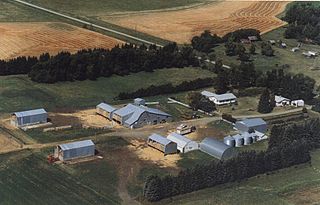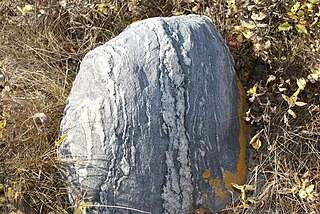Related Research Articles

The Time in Between is a novel by Canadian author David Bergen. It deals with a man, who mysteriously returns to Vietnam, where he had been a soldier earlier in his life, followed by his children, who also go to Vietnam to search for him. The novel was the recipient of the Scotiabank Giller Prize and the McNally Robinson Book of the Year Award in 2005.

Manitoba is a province of Canada at the longitudinal centre of the country. It is Canada's fifth-most populous province, with a population of 1,342,153 as of 2021. Manitoba has a widely varied landscape, from arctic tundra and the Hudson Bay coastline in the north to dense boreal forest, large freshwater lakes, and prairie grassland in the central and southern regions.
Bonnie Burnard was a Canadian short story writer and novelist, best known for her 1999 novel, A Good House, which won the Scotiabank Giller Prize.

The Canadian Prairies is a region in Western Canada. It includes the Canadian portion of the Great Plains and the Prairie provinces, namely Alberta, Saskatchewan, and Manitoba. These provinces are partially covered by grasslands, plains, and lowlands, mostly in the southern regions. The northernmost reaches of the Canadian Prairies are less dense in population, marked by forests and more variable topography. If the region is defined to include areas only covered by prairie land, the corresponding region is known as the Interior Plains. Physical or ecological aspects of the Canadian Prairies extend to northeastern British Columbia, but that area is not included in political use of the term.

The Cypress Hills are a geographical region of hills in southwestern Saskatchewan and southeastern Alberta, Canada. The hills are part of the Missouri Coteau upland. The hills cover an area of approximately 2,500 km2 (970 sq mi). About 400 km2 (150 sq mi) or 16% of this area is an interprovincial park.

Leonard Joseph Cariou is a Canadian stage actor, singer and stage director. He gained prominence for his portrayal of Sweeney Todd in the original cast of Stephen Sondheim's musical Sweeney Todd: The Demon Barber of Fleet Street (1979) alongside Angela Lansbury for which he won the Tony Award for Best Actor in a Musical. He also received Tony nominations for his roles in the Betty Comden and Adolph Green musical Applause (1970), and the Sondheim musical A Little Night Music (1973).
Treaty Five is a treaty between Queen Victoria and Saulteaux and Swampy Cree non-treaty band governments and peoples around Lake Winnipeg in the District of Keewatin. Much of what is today central and northern Manitoba was covered by the treaty, as were a few small adjoining portions of the present-day provinces of Saskatchewan and Ontario.
Dianne Warren is a Canadian novelist, dramatist and short story writer.
Highway 1 is the Saskatchewan section of the Trans-Canada Highway mainland route. The total distance of the Trans-Canada Highway in Saskatchewan is 654 kilometres (406 mi). The highway traverses Saskatchewan from the western border with Alberta, from Highway 1, to the Manitoba border where it continues as PTH 1. The Trans-Canada Highway Act was passed on December 10, 1949. The Saskatchewan segment was completed August 21, 1957, and completely twinned on November 6, 2008. The speed limit along the majority of the route is 110 kilometres per hour (70 mph) with urban area thoroughfares slowing to a speed of 80–100 kilometres per hour (50–62 mph). Portions of the highway—the section through Swift Current, an 8-kilometre (5 mi) section east of Moose Jaw, and a 44-kilometre (27 mi) section between the West Regina Bypass and Balgonie—are controlled-access. Highway 1 serves as a major east–west transport route for commercial traffic. It is the main link between southern Saskatchewan's largest cities, and also serves as the province's main link to the neighbouring provinces of Alberta and Manitoba.
Highway 3 is a major provincial highway in the Canadian province of Saskatchewan. It runs from the Alberta border, where it continues west as Alberta Highway 45, to the Manitoba border, and then continues east as Highway 77. Highway 3 is about 615 km (382 mi.) long. The CanAm Highway comprises Saskatchewan Highways 35, 39, 6, 3, as well as 2. 59.7 miles (96.1 km) of Saskatchewan Highway 3 contribute to the CanAm Highway between Melfort and Prince Albert.

The Red Coat Trail is a 1,300-kilometre (810 mi) route that approximates the path taken in 1874 by the North-West Mounted Police in their March West from Fort Dufferin to Fort Whoop-Up.

The Big Muddy Badlands are a series of badlands in southern Saskatchewan, Canada, and northern Montana, United States, in the Big Muddy Valley and along Big Muddy Creek. Big Muddy Valley is a cleft of erosion and sandstone that is 55 kilometres (34 mi) long, 3.2 kilometres (2.0 mi) wide, and 160 metres (520 ft) deep.
Alison Calder is a Canadian poet, literary critic and educator.

The geology of Saskatchewan can be divided into two main geological regions, the Precambrian Canadian Shield and the Phanerozoic Western Canadian Sedimentary Basin. Within the Precambrian shield exists the Athabasca sedimentary basin. Meteorite impacts have altered the natural geological formation processes. The prairies were most recently affected by glacial events in the Quaternary period.
The following is a bibliography of Alberta history.
The following is a bibliography of Saskatchewan history.

Métis buffalo hunting began on the North American plains in the late 1700s and continued until 1878. The great buffalo hunts were subsistence, political, economic, and military operations for Métis families and communities living in the region. At the height of the buffalo hunt era, there were two major hunt seasons: summer and autumn. These hunts were highly organized, with an elected council to lead the expedition. This made sure the process was fair and all families were well-fed and provided for throughout the year.
Marion Ironquill Meadmore is an Ojibwa-Cree Canadian activist and lawyer. Meadmore was the first woman of the First Nations to attain a law degree in Canada. She founded the first Indian and Métis Friendship Centre in Canada to assist Indigenous people who had relocated to urban areas with adjustments to their new communities. She edited the native newspaper The Prairie Call, bringing cultural events as well as socio-economic challenges into discussion for native communities. She was the only woman on the Temporary Committee of the National Indian Council, which would later become the Assembly of First Nations, and would become the secretary-treasurer of the organization when it was formalized. She was one of the women involved in the launch of the Kinew Housing project, to bring affordable, safe housing to indigenous urban dwellers and a founder of the Indigenous Bar Association of Canada. She has received the Order of Canada as well as many other honors for her activism on behalf of indigenous people. She was a founder and currently serves on the National Indigenous Council of Elders.
Sarah Alexandra Carter is a Canadian historian. She is Professor and the Henry Marshall Tory Chair at the University of Alberta in both the Department of History and Classics and the Faculty of Native Studies with noted specialties in Indigenous and women's history.
Marvin Francis (1955–2005) was a Cree poet from Winnipeg, Manitoba best known for his book-length poem City Treaty published by Turnstone Press.
References
- ↑ "Faculty of Arts - English, Film and Theatre - Faculty Details: Warren Cariou". University of Manitoba -. Retrieved 29 May 2011.
- ↑ "2004 Finalists". The Charles Taylor Prize for Literary non-fiction. Retrieved 29 May 2011.
- ↑ "The Scotiabank Giller Prize Announces 2005 Shortlist". Scotiabank Giller Prize. September 28, 2005. Retrieved 29 May 2011.
- 1 2 3 "About". Warren Cariou. Retrieved 2019-03-22.
- ↑ Cariou, Warren (2016). "Life-Telling: Indigenous Oral Autobiography and the Performance of Relation". Biography. 39 (3): 314–327. doi:10.1353/bio.2016.0041. S2CID 164591127.
- 1 2 "Winnipeg Film Group" . Retrieved 2019-03-22.
- 1 2 3 "Petrography". Warren Cariou. Retrieved 2019-03-22.